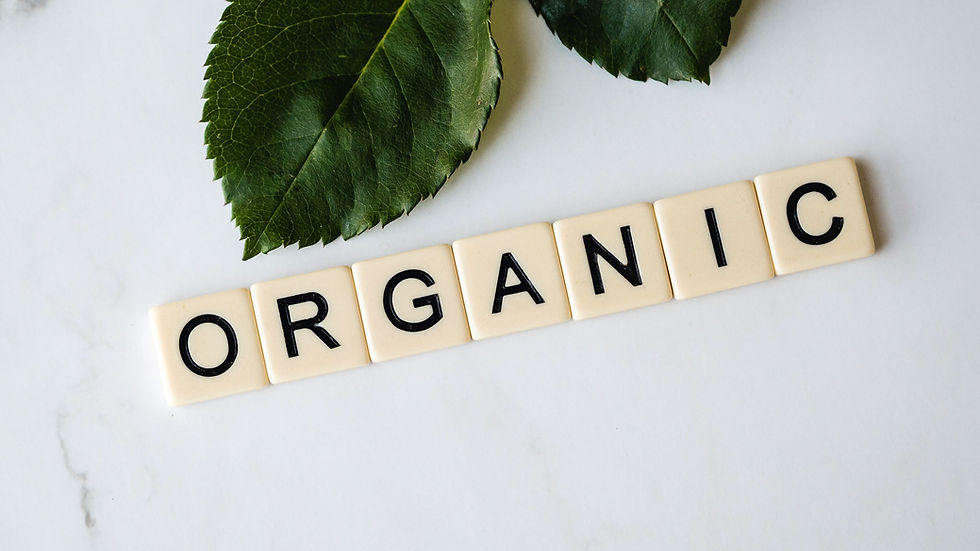Why choose organic?
- melissaulev
- Apr 9, 2023
- 3 min read
Updated: Aug 23, 2023

You may think that organic is a fad or trend, but that simply is not true. Did you know that most conventional foods are genetically modified organisms (GMOs), and sprayed with pesticides and herbicides? USDA Certified Organic farmers have to use different standards when growing food. They are not allowed to use synthetic fertilizers, pesticides, sewage sludge, GMOs or ionizing radiation.
As we know, nutrition plays a vital role in maintaining our overall health and wellness. With the modern food industry’s focus on profit, many of the foods we consume on a daily basis are loaded with damaging chemicals and GMOs. These substances negatively effect our health, making it more important than ever to choose organic foods free from chemical or genetic modification.
On a budget? For a list of the most important foods to eat organic, check out the environmental working groups dirty dozen list. Better yet, buy seasonal and local from your farmers market, or grow your own food. There is a lot you can do in container gardens if you don't have a lot of space. Below are my top 5 reasons to eat organic.

1) Certified organic foods are also non-GMO. When choosing organic foods, you are ensuring that you are not consuming GMOs as the USDA organic regulations prohibit against it. GMOs are created by altering the DNA of plants and animals to exhibit desirable traits, such as resistance to pests though; we still do not fully understand the long-term effects of consuming GMOs. Non-GMO crops can be grown the same as other conventional crops and can still be laden with toxic pesticide residues, including organophosphates that are linked to lymphoma and leukemia.

2) Reduce your exposure to synthetic pesticides. Conventionally (or non-organic) grown foods are frequently treated with synthetic pesticides to protect crops from insects, diseases, and weeds. By choosing organic produce, you can drastically decrease your exposure to these toxic chemicals. Note that Non-GMO Project Verified foods can and do use pesticides. Studies show that certain pesticides are linked to cancer so it's best to avoid them when possible. https://childrenshealthdefense.org/defender/roundup-glyphosate-weedkiller-breast-cancer/. Studies have shown that consuming organic foods leads to a lower concentration of pesticide residues in the body, decreasing the risk of pesticide-related health problems.

3) Better nutrient content. Studies suggest that organic foods have higher levels of certain nutrients, such as vitamins, minerals, and antioxidants. These nutrients play vital roles in maintaining our health and preventing chronic diseases. Better nutrient content in your food equals a more balanced gut, full of beneficial bacteria, which results in the magic of restoring your health. A pubmed study found that "reviews of multiple studies show that organic varieties do provide significantly greater levels of vitamin C, iron, magnesium, and phosphorus than non-organic varieties of the same foods. While being higher in these nutrients, they are also significantly lower in nitrates and pesticide residues. In addition, with the exception of wheat, oats, and wine, organic foods typically provide greater levels of a number of important antioxidant phytochemicals (anthocyanins, flavonoids, and carotenoids)."

4) Protects soil health. By not using toxic pesticides or GMOs, the soil is allowed to be healthy, robust and full of helpful microorganisms. Healthy soil is crucial for producing nutritious food and supporting the ecosystem. Just as our bodies need nutrients from our food, our food needs nutrients from the soil. Organic farming practices prioritize soil health, using methods such as no-dig growing, crop rotation, cover cropping, companion planting, and composting all which maintain and improve soil quality. This, consequently, can enhance the nutritional value of the food produced.

5) Organic animals are not fed antibiotics to make them fatter. Have you ever looked at organic chicken legs compared to conventional chicken legs? The conventional ones look like they belong to a turkey! This is due to the use of growth-promoting antibiotics in conventional animals. The overuse of these antibiotics is creating superbugs that threaten the entire population. Antibiotics have been used, not only to fight infection in humans, but also to fatten up farm animals which is polluting our environment, water and food supply. Antibiotics kill off all bacteria in the gut, including the beneficial bacteria. Many experts describe the gut as the second brain because it produces more neurotransmitters than the actual brain. So improving beneficial bacteria, as opposed to killing it off with the foods we eat (and the antibiotics they eat), may be the answer to the health problems we have.
Choosing organic foods is a crucial step towards a healthier, more sustainable, and happier lifestyle. By understanding the benefits of organic foods and learning how to identify them, you can make informed choices that support your health as well as the environment. Keep in mind, every time you choose organic, you are voting with your dollars for a better food system. This simple act prioritizes sustainability, ethical practices, and the health of yourself and the planet.

white%20backround.png)



Comments